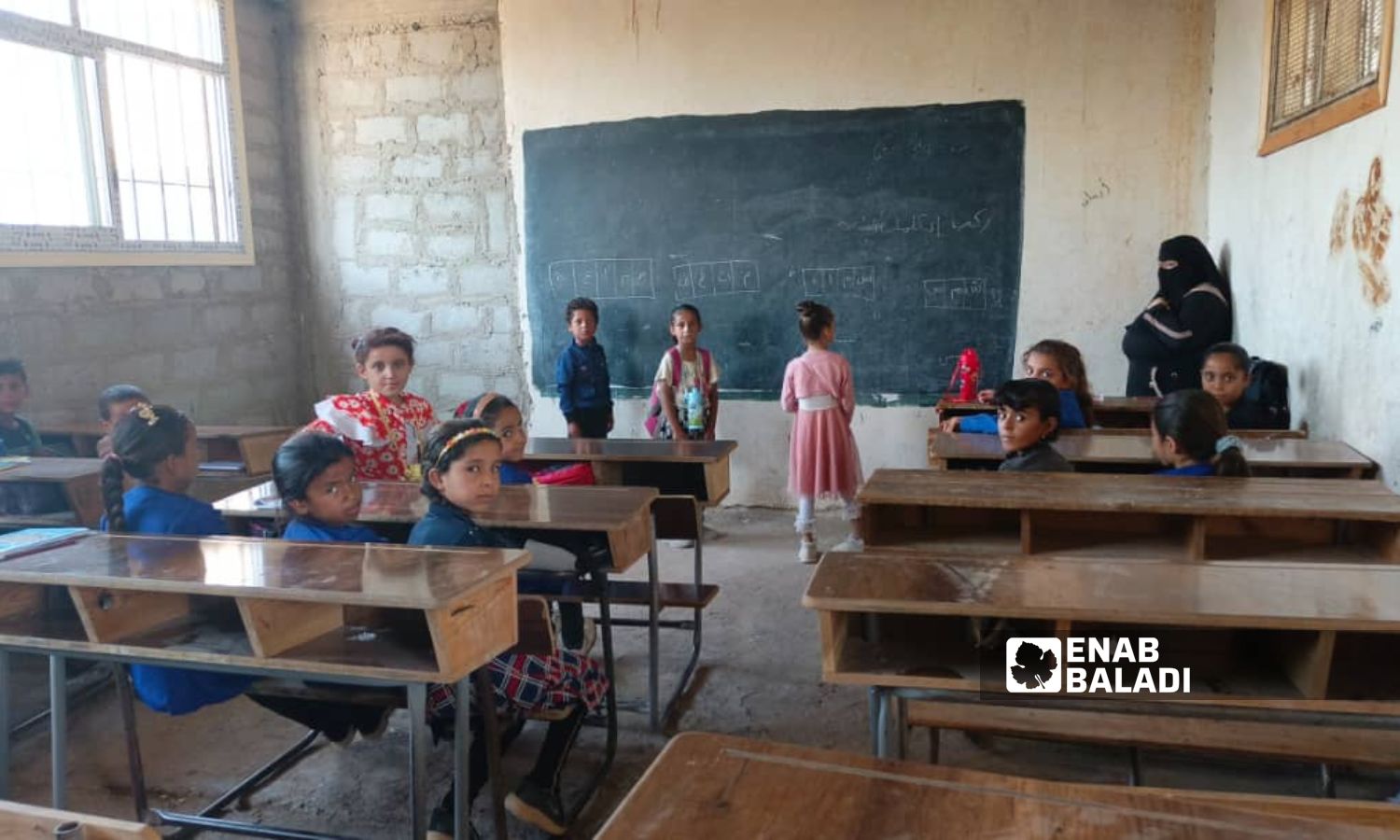



Deir Ezzor – Obadah al-Sheikh
Workers in the educational sector in the eastern countryside of Deir Ezzor, where the Autonomous Administration of North and East Syria (AANES) controls, have resigned following the re-introduction of a new curriculum that the people of the tribal region see as conflicting with their culture.
In the Jazeera and Hajin educational complexes, six teachers submitted their resignations, along with Marwan Ali al-Mohammed and Muntaha Maddah al-Hammadi, who hold the position of co-presidents of the Jazeera schools administration.
These resignations are the largest in terms of number since the Syrian Democratic Forces (SDF) took control of the region in 2018.
The educational sector in the countryside of Deir Ezzor suffers from general neglect, as a result of which the educational process faces numerous challenges, the most prominent of which is the shortage of educational staff.
Last May, the Curriculum Foundation affiliated with the Autonomous Administration announced its intention to renew and replace the curricula for primary, intermediate, and secondary school levels, including the renewal of the Arabic and Kurdish language curricula.
Hawar News Agency, close to the Autonomous Administration, reported from Darshin Khalil, an official at the Curriculum Foundation, that the institution reviewed all curriculum books, taking into account suggestions from teachers and students.
In the first phase, the curricula for the first, fourth, seventh, and tenth grades will be replaced, with this change expected to be completed by the summer of 2024 and implemented starting from the 2024–2025 academic year.
Education for the second, fifth, eighth, and eleventh grades will continue under the current curriculum, which will be replaced in the second phase during the 2025–2026 academic year.
In the third phase, the curricula for the third, sixth, ninth, and Baccalaureate grades will be replaced according to the changes made in the second phase, to be completed in the summer of 2026 and implemented in the 2026–2027 academic year.
Despite Deir Ezzor’s need for education, which has deteriorated since the Islamic State group took control of the province in mid-2014, some parents have refrained from sending their children to schools since mid-last year, protesting against the Autonomous Administration’s attempts to change the curriculum at the expense of addressing the lack of support suffered by the education sector.
Over the past years, the Autonomous Administration managing the areas east of the Euphrates River in northeastern Syria has not attempted to improve services or even build schools to accommodate some students in Deir Ezzor. Instead, it has focused on reassessing the available curriculum and introducing a new one that teaches the philosophy of the Kurdistan Workers’ Party (PKK) founder, Abdullah Öcalan.
Residents of the province considered the imposition of the educational curriculum at the time offensive to their culture, while others saw it as “offensive to religion,” prompting strikes and protests.
Enab Baladi met with several of the resigned teachers, and a teacher who preferred to remain anonymous for security reasons said the reason for the resignation was the arbitrariness of those close to the SDF in making spontaneous decisions without consulting the head of the educational complex, as well as their failure to meet the schools’ needs. This also motivated the resignation of the two administrators.
For a while, educational groups have been demanding a series of school reforms, including painting boards (blackboards), providing water and stationery, and securing educational tools to revive the educational process, but none of these demands have been met.
The teacher told Enab Baladi that the dismissal of several followers in the complex without consulting or discussing with the officials has also been repeated in recent months. Also, efforts for conducting new recruitment competitions to fill the teacher shortage in the area have been rejected.
Marwan, a resigned teacher who withheld his full name for fear of retaliatory action against him, said that leaving the educational process is better than continuing it due to the “domineering” of some workers in the sector and the marginalization of Deir Ezzor from educational services.
He added that he would turn to a private institute, considering it a better option than continuing to work with the Education Committee affiliated with the Deir Ezzor Civil Council under the Autonomous Administration.
The teacher pointed out that the educational process suffers from a shortage of staff and school supplies, and if things remain as they are, it will witness further deterioration over time.
Samir al-Hassan, a teacher at a school in eastern Deir Ezzor, told Enab Baladi that the curriculum is locally rejected, and teachers in the region continue to use the UNICEF curriculum, although it does not fully meet students’ needs, it is better than the curriculum the Autonomous Administration has been trying to impose for years.
The teacher called on the UNICEF organization to intervene to prevent the Autonomous Administration from trying to impose the new curriculum, as Deir Ezzor schools have been using the organization’s curriculum since 2019. He also demanded that the Autonomous Administration increase salaries and appoint guards to reduce theft cases.
if you think the article contain wrong information or you have additional details Send Correction